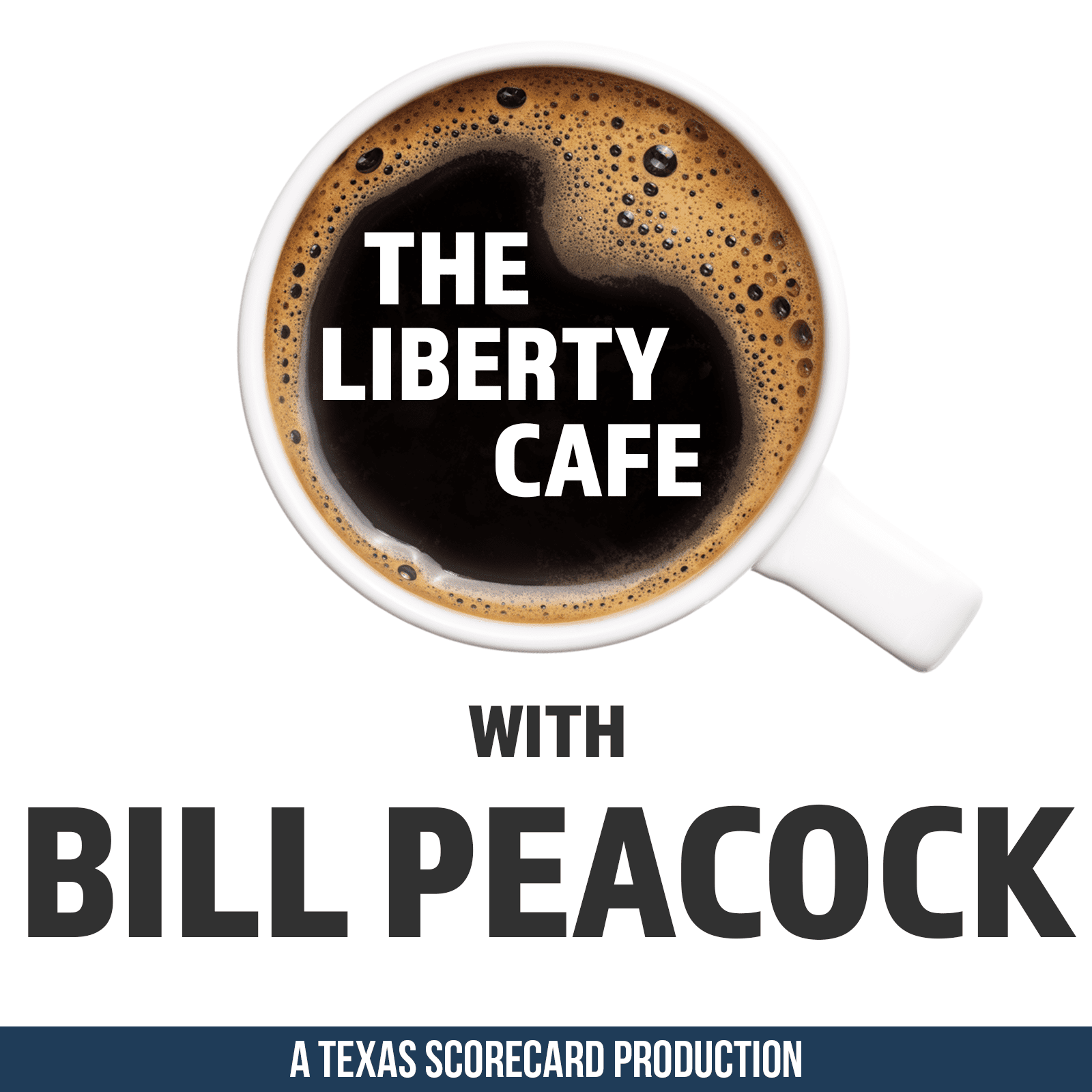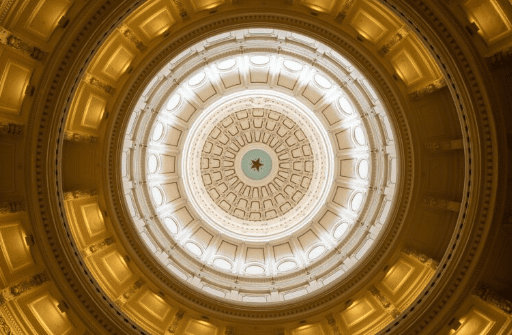
Texas politicians have $64 billion of new revenue to distribute to favored constituencies this legislative session. On this week’s Liberty Cafe, we discuss how little of that is targeted for taxpayers in the form of property tax cuts.
This podcast was transcribed by a robot called Otter.ai. Please forgive any errors in the text, as robots still have a lot to learn:
Bill Peacock
Well, you may have heard that the Texas Legislature is sitting on about a $32 billion budget surplus. But what that doesn’t really tell you is that’s just for this past two years. If you look at the new money that the extra money that they have to spend over the next two years versus what they had, over the last two years, they’re actually sitting on about $64 billion of new revenue. So you might be wondering, well, how much of that $64 billion of new revenue? Are they gonna give back to me? Do they need to spin it all? Shouldn’t I get some of that back? Why do they need all that new revenue? Well, those are really good questions to ask. And that’s what we’re going to talk about, on this week’s episode 116 of the Liberty cafe. Hi, this is Bill Peacock, and I’m really glad matter of fact, I’m blessed that you are with me here today on the Liberty cafe, thinking about what we can do to fight for liberty here in Texas. And I’m also glad to be a part of the Texas scorecard network. They’re the sponsors of the Liberty cafe. And together, I think we’re making some really good progress and, and building a world that’s focused on liberty, the kind of liberty that God would have us live under first Christian liberty to do what is right, according to him, but also liberty to walk in obedience to Him in the world around us. Well, as I already mentioned, the Texas Legislature is sitting on $64 billion dollars, give or take a few billion dollars in new revenue. The way to think about that is if the legislature spent as much money over the next two years, they have a biennial to your budget. So if the legislature spent as much money over the next two years, as they did the last two years, they’d have 64 billion extra dollars to deal with. That’s they could do whatever they wanted to with it. Well, unfortunately, when the legislature gets its hands on extra money, or new money like that, usually We’re the last ones that they think about, and that’s really unfortunate. But it’s really actually the way it usually is. So you may have heard a lot of talk about how they’re going to spend that when it comes to property tax cuts and other things. Well, the number that has been floated around out there? Well, it depends on who you’re listening to. Governor Abbott, to his credit, came out and said that he wanted the largest property tax cut ever and wanted it or and or wanted to spend about half the budget surplus for property tax relief, depending on how you do that. But if you go back, the biggest tax cut was back in 2006, it was about $15 billion. If you index that for inflation, you’re looking at about $20 billion. Or if you just do half the budget surplus, it’s about $16 billion. But but that’s not what they’re talking about. Now the legislature has come out with a plan or people in it have come out with a plan that we’re talking about $15 billion for property tax relief. That sounds pretty good. Until you realize that little more than $5 billion are that is just paying for the property tax relief they promised us last go around in 2021. It’s nothing new. They’re just pretending like it’s new property tax relief, because $15 billion sounds a lot better than $9.7 billion, particularly when you compare it to 32 billion, or $64 billion. So they’re trying to inflate the amount. It’s budget gimmicks, like they do all the time in the legislature. So when you really look at the numbers that they’re talking about. It looks like right now $9.7 billion for property tax relief is what we’re looking at it just to put that in perspective, the there’s also been talk about increasing teacher salaries, maybe as much as $6 billion. And then there’s all this kind of spinning, focused on infrastructure and a lot of other things. So but the bottom line at this point is we’re looking at about a $9.7 billion effort for property tax relief, out of $64 billion worth of new money. So you can do the math, but that’s somewhere in the neighborhood of $53 billion in new spending $9.7 billion coming back to us. We’re just not at the top of the list. So let me let me kind of look at these numbers for you. and give you some idea what that would actually look like from the perspective of property tax relief. So in this this past year 2022, we, if you have a home, or you have a business, you just wrote your property taxes, check for them, or maybe it comes out of your mortgage, but the property tax, property taxes for 2022, we’re just due in January, the total property tax levy, for the entire state, this is for special districts, counties, cities and school districts was at $1.9 billion. That’s a lot of property tax money that we send to local governments, and then also to the state because they take a lot of it and spin it on school districts. That was a big jump from the previous year back in 2021. But $8.9 billion. In fact, it went up about 12%. school property taxes actually went up about 13% during that period of time. This is despite the property tax relief effort that the legislature promised us and to 2021, where they expanded the homestead exemption and the 2019 effort where they did the compression, which is reducing school property tax rates, and putting limits on how much property taxes could grow. But, you know, for counties and cities, they put this 3.5% limit on it. But it turns out, those aren’t really the limits. So instead of 3.5% growth and property taxes each year, we saw 13% 12% This last year, it I could go into all the details, but I want just keep in mind that what they tell you is rarely the truth when it comes to how much money they’re spending. So we’ve got this $81 billion $82 billion, basically in property tax revenue. If the legislature goes forward with their plan, and does this $9.7 billion next year, this coming January, the property tax levy will be will go up to $84.3 billion. That’s based on historic growth rates minus the the property tax relief, there’ll be given us in year one, you got to remember that this 9.7 is a two year release. So they have to put some of it in the first year 2023. And then some of it in 2024. And so even though they put this money towards it, and it would actually be about $3.2 billion reduction in school property taxes. Based on historical growth, overall property taxes would go up, again to $84.3 billion, which is about a 2.6 $2.4 billion increase. So your property taxes won’t go down, they’ll go up and go up by quite a bit. Then if we go into 2024, we’ll see basically the same thing. school, school property taxes will again stay about leveled, they’ll drop just a little bit, so about $400 million or so. But overall property taxes, they’re going to go up again, by about 3.5 $2.5 billion again. So if you look overall, during the next two year period, where we’re getting this $9.7 billion in property tax relief, actually, property taxes are going to go up during that whole period of time. But about $4.9 billion, that 6% increase over two years, about 3% per year, over two years. Meanwhile, school property taxes are going to decrease a little bit about $790 billion, million dollars, excuse me, but only about 1.8%. So you can see what they’re talking about is not going to provide as much property tax relief. It’s just it’s just not going to do it. And the reason for all that is because the legislature isn’t doing anything to control the big problem when it comes to increasing property taxes, which is increasing spending by local governments and school districts. They can keep throwing billions and billions that property tax relief. But unless they throw it up billions just to overwhelm the host whole system. It’s not going to do all that much good because cities and counties and special purpose districts and schools continue to spend and spend and spend and spend. They need to do something about that. Before I talk about what they might be able to do on that. Let me just go through the scenario really quickly. And look at the fact what happens if actually The legislature did come up with this $20 billion largest property tax relief effort in history, well, then we would actually see some actual relief actually reduction in property taxes. So for instance, if they put this $20 billion over the next two years into it, property taxes will go down by a billion dollars in 2023. And by about another billion dollars, in 2024. So we will see actual true property tax relief in reductions, property tax cuts, never seen that before. Well, we saw a slight property tax cut back in 2006, when they came up with their $15 billion, but it shot right back up the next year, and it was it was gone. So it’s possible we could see this. But still we come to the situation where it’s not really going to solve the problem. unless they do something about local spending growth, what can they do? Well, they can really do two things. One is they can impose a tax and expenditure kind of limit, the state of Texas has a tax and expenditure limit, where they can only increase their spending by so much at a local level. I think that’s a fine idea. The problem with it is it’s new. And it might be done at some point time, but it’s gonna take a little while to impose those on local entities. And there’ll be a lot of pushback on that. I think the better way that because it’s familiar with with folks in the legislature in local districts is, is making school districts and cities and counties and special purpose districts have to go to voters to increase their property tax rates, higher than the no new revenue tax rate. Now, like it is, with most things around the government these days, the no new revenue tax rate doesn’t really mean no new revenue for these local taxing entities, it would allow an increase based on new development. So if somebody builds a high rise condo, or there used to be a one storey building, there won’t be any limits on the growth of revenue from there. But nonetheless, even with that, you would probably only allow overall the state property taxes to go up by about 2%. Maybe. And that’s, you know, without a vote, somewhere like that, that’s far better than the 12% we had this year, or the three year running average of about 6% or so, that would be a big thing. If we could put that into place and spend $20 billion on real property tax relief, we can see significant cuts to our overall property taxes, school property taxes would just take a nosedive. And in fact, we’d be on the pathway toward elimination. So it’s up to us though, if the Texas legislature doesn’t hear from us, they’re not going to do this kind of stuff, we’re gonna get stuck with a $9 billion property tax relief bill, it really doesn’t provide us much relief at all, in the schools and local governments are going to keep spending money. And we’re not going to be much better off after this legislative session than when we are now. So if you want a property tax cut, speak up, talk to your legislature, legislators and tell him you want real property tax relief. Well, thanks for joining me here on episode 16 116 at the Liberty Cafe, and thanks once again to Texas scorecard for being our sponsor.
Transcribed by https://otter.ai




